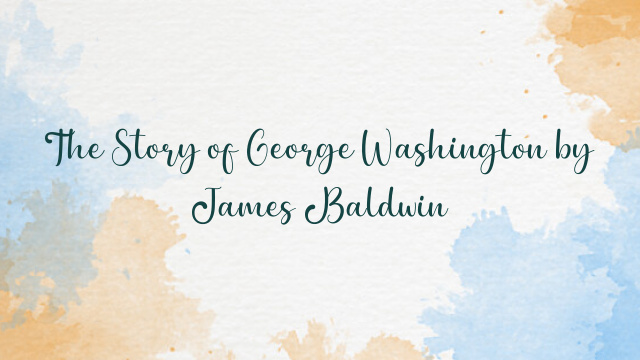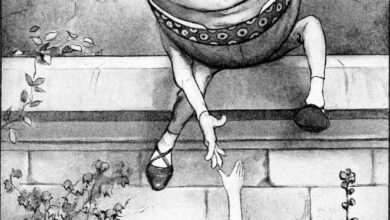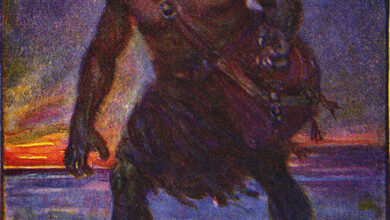
The Story of George Washington by James Baldwin
Chapter IV: Going to Sea
Once every summer a ship came up the river to the plantation, and was moored near the shore.
It had come across the sea from far-away England, and it brought many things for those who were rich enough to pay for them.
It brought bonnets and pretty dresses for George’s mother and sisters; it brought perhaps a hat and a tailor-made suit for himself; it brought tools and furniture, and once a yellow coach that had been made in London, for his brother.
When all these things had been taken ashore, the ship would hoist her sails and go on, farther up the river, to leave goods at other plantations.
In a few weeks it would come back and be moored again at the same place.
Then there was a busy time on shore. The tobacco that had been raised during the last year must be carried on shipboard to be taken to the great tobacco markets in England.
The slaves on the plantation were running back and forth, rolling barrels and carrying bales of tobacco down to the landing.
Letters were written to friends in England, and orders were made out for the goods that were to be brought back next year.
But in a day or two, all this stir was over. The sails were again spread, and the ship glided away on its long voyage across the sea.
George had seen this ship coming and going every year since he could remember. He must have thought how pleasant it would be to sail away to foreign lands and see the many wonderful things that are there.
And then, like many another active boy, he began to grow tired of the quiet life on the farm, and wish that he might be a sailor.
He was now about fourteen years old. Since the death of his father, his mother had found it hard work, with her five children, to manage her farm on the Rappahannock and make everything come out even at the end of each year. Was it not time that George should be earning something for himself? But what should he do?
He wanted to go to sea. His brother Lawrence, and even his mother, thought that this might be the best thing.
A bright boy like George would not long be a common sailor. He would soon make his way to a high place in the king’s navy. So, at least, his friends believed.
And so the matter was at last settled. A sea-captain who was known to the family, agreed to take George with him. He was to sail in a short time.
The day came. His mother, his brothers, his sisters, were all there to bid him good-bye. But in the meanwhile a letter had come to his mother, from his uncle who lived in England.
“If you care for the boy’s future,” said the letter, “do not let him go to sea. Places in the king’s navy are not easy to obtain. If he begins as a sailor, he will never be aught else.”
The letter convinced George’s mother—it half convinced his brothers—that this going to sea would be a sad mistake. But George, like other boys of his age, was headstrong. He would not listen to reason. A sailor he would be.
The ship was in the river waiting for him. A boat had come to the landing to take him on board.
The little chest which held his clothing had been carried down to the bank. George was in high glee at the thought of going.
“Good-bye, mother,” he said.
He stood on the doorstep and looked back into the house. He saw the kind faces of those whom he loved. He began to feel very sad at the thought of leaving them.
“Good-bye, George!”
He saw the tears welling up in his mother’s eyes. He saw them rolling down her cheeks. He knew now that she did not want him to go. He could not bear to see her grief.
“Mother, I have changed my mind,” he said. “I will not be a sailor. I will not leave you.”
Then he turned to the black boy who was waiting by the door, and said, “Run down to the landing and tell them not to put the chest on board. Tell them that I have thought differently of the matter and that I am going to stay at home.”
If George had not changed his mind, but had really gone to sea, how very different the history of this country would have been!
He now went to his studies with a better will than before; and although he read but few books he learned much that was useful to him in life. He studied surveying with especial care, and made himself as thorough in that branch of knowledge as it was possible to do with so few advantages.
Chapter V: The Young Surveyor
Lawrence Washington was about fourteen years older than his brother George. As I have already said, he had been to England and had spent sometime at Appleby school. He had served in the king’s army for a little while, and had been with Admiral Vernon’s squadron in the West Indies.
He had formed so great a liking for the admiral that when he came home he changed the name of his plantation at Hunting Creek, and called it Mount Vernon—a name by which it is still known.
Not far from Mount Vernon there was another fine plantation called Belvoir, that was owned by William Fairfax, an English gentleman of much wealth and influence.
Now this Mr. Fairfax had a young daughter, as wise as she was beautiful; and so, what should Lawrence Washington do but ask her to be his wife? He built a large house at Mount Vernon with a great porch fronting on the Potomac; and when Miss Fairfax became Mrs. Washington and went into this home as its mistress, people said that there was not a handsomer or happier young couple in all Virginia.
After young George Washington had changed his mind about going to sea, he went up to Mount Vernon to live with his elder brother. For Lawrence had great love for the boy, and treated him as his father would have done.
At Mount Vernon George kept on with his studies in surveying. He had a compass and surveyor’s chain, and hardly a day passed that he was not out on the plantation, running lines and measuring his brother’s fields.
Sometimes when he was busy at this kind of work, a tall, white-haired gentleman would come over from Belvoir to see what he was doing and to talk with him. This gentleman was Sir Thomas Fairfax, a cousin of the owner of Belvoir. He was sixty years old, and had lately come from England to look after his lands in Virginia; for he was the owner of many thousands of acres among the mountains and in the wild woods.
Sir Thomas was a courtly old gentleman, and he had seen much of the world. He was a fine scholar; he had been a soldier, and then a man of letters; and he belonged to a rich and noble family.
It was not long until he and George were the best of friends. Often they would spend the morning together, talking or surveying; and in the afternoon they would ride out with servants and hounds, hunting foxes and making fine sport of it among the woods and hills.
And when Sir Thomas Fairfax saw how manly and brave his young friend was, and how very exact and careful in all that he did, he said: “Here is a boy who gives promise of great things. I can trust him.”
Before the winter was over he had made a bargain with George to survey his lands that lay beyond the Blue Ridge mountains.
I have already told you that at this time nearly all the country west of the mountains was a wild and unknown region. In fact, all the western part of Virginia was an unbroken wilderness, with only here and there a hunter’s camp or the solitary hut of some daring woodsman.
But Sir Thomas hoped that by having the land surveyed, and some part of it laid out into farms, people might be persuaded to go there and settle. And who in all the colony could do this work better than his young friend, George Washington?
It was a bright day in March, 1748, when George started out on his first trip across the mountains. His only company was a young son of William Fairfax of Belvoir.
The two friends were mounted on good horses; and both had guns, for there was fine hunting in the woods. It was nearly a hundred miles to the mountain-gap through which they passed into the country beyond. As there were no roads, but only paths through the forest, they could not travel very fast.
After several days they reached the beautiful valley of the Shenandoah. They now began their surveying. They went up the river for some distance; then they crossed and went down on the other side. At last they reached the Potomac River, near where Harper’s Ferry now stands.
At night they slept sometimes by a camp-fire in the woods, and sometimes in the rude hut of a settler or a hunter. They were often wet and cold. They cooked their meat by broiling it on sticks above the coals. They ate without dishes, and drank water from the running streams.
One day they met a party of Indians, the first red men they had seen. There were thirty of them, with their bodies painted in true savage style; for they were just going home from a war with some other tribe.
The Indians were very friendly to the young surveyors. It was evening, and they built a huge fire under the trees. Then they danced their war-dance around it, and sang and yelled and made hideous sport until far in the night.
To George and his friend it was a strange sight; but they were brave young men, and not likely to be afraid even though the danger had been greater.
They had many other adventures in the woods of which I cannot tell you in this little book—shooting wild game, swimming rivers, climbing mountains. But about the middle of April they returned in safety to Mount Vernon.
It would seem that the object of this first trip was to get a general knowledge of the extent of Sir Thomas Fairfax’s great woodland estate—to learn where the richest bottom lands lay, and where were the best hunting-grounds.
The young men had not done much if any real surveying; they had been exploring.
George Washington had written an account of everything in a little note-book which he carried with him.
Sir Thomas was so highly pleased with the report which the young men brought back that he made up his mind to move across the Blue Ridge and spend the rest of his life on his own lands.
And so, that very summer, he built in the midst of the great woods a hunting lodge which he called Greenway Court. It was a large, square house, with broad gables and a long roof sloping almost to the ground.
When he moved into this lodge he expected soon to build a splendid mansion and make a grand home there, like the homes he had known in England. But time passed, and as the lodge was roomy and comfortable, he still lived in it and put off beginning another house.
Washington was now seventeen years old. Through the influence of Sir Thomas Fairfax he was appointed public surveyor; and nothing would do but that he must spend the most of his time at Greenway Court and keep on with the work that he had begun.
For the greater part of three years he worked in the woods and among the mountains, surveying Sir Thomas’s lands. And Sir Thomas paid him well—a doubloon ($8.24) for each day, and more than that if the work was very hard.
But there were times when the young surveyor did not go out to work, but stayed at Greenway Court with his good friend, Sir Thomas. The old gentleman had something of a library, and on days when they could neither work nor hunt, George spent the time in reading. He read the Spectator and a history of England, and possibly some other works.
And so it came about that the three years which young Washington spent in surveying were of much profit to him.
The work in the open air gave him health and strength. He gained courage and self-reliance. He became acquainted with the ways of the backwoodsmen and of the savage Indians. And from Sir Thomas Fairfax he learned a great deal about the history, the laws, and the military affairs of old England.
And in whatever he undertook to do or to learn, he was careful and systematic and thorough. He did nothing by guess; he never left anything half done. And therein, let me say to you, lie the secrets of success in any calling.
Chapter VI: The Ohio Country
You have already learned how the English people had control of all that part of our country which borders upon the Atlantic Ocean. You have learned, also, that they had made thirteen great settlements along the coast, while all the vast region west of the mountains remained a wild and unknown land.
Now, because Englishmen had been the first white men to see the line of shore that stretches from Maine to Georgia, they set up a claim to all the land west of that line.
They had no idea how far the land extended. They knew almost nothing about its great rivers, its vasts forests, its lofty mountains, its rich prairies. They cared nothing for the claims of the Indians whose homes were there.
“All the land from ocean to ocean,” they said, “belongs to the King of England.” But there were other people who also had something to say about this matter.
The French had explored the Mississippi River. They had sailed on the Great Lakes. Their hunters and trappers were roaming through the western forests. They had made treaties with the Indians; and they had built trading posts, here and there, along the watercourses.
They said, “The English people may keep their strip of land between the mountains and the sea. But these great river valleys and this country around the Lakes are ours, because we have been the first to explore and make use of them.”
Now, about the time that George Washington was thinking of becoming a sailor, some of the rich planters in Virginia began to hear wonderful stories about a fertile region west of the Alleghanies, watered by a noble river, and rich in game and fur-bearing animals.
This region was called the Ohio Country, from the name of the river; and those who took pains to learn the most about it were satisfied that it would, at some time, be of very great importance to the people who should control it.
And so these Virginian planters and certain Englishmen formed a company called the Ohio Company, the object of which was to explore the country, and make money by establishing trading posts and settlements there. And of this company, Lawrence Washington was one of the chief managers.
Lawrence Washington and his brother George had often talked about this enterprise.
“We shall have trouble with the French,” said Lawrence. “They have already sent men into the Ohio Country; and they are trying in every way to prove that the land belongs to them.”
“It looks as if we should have to drive them out by force,” said George.
“Yes, and there will probably be some hard fighting,” said Lawrence; “and you, as a young man, must get yourself ready to have a hand in it.”
And Lawrence followed this up by persuading the governor of the colony to appoint George as one of the adjutants-general of Virginia.
George was only nineteen years old, but he was now Major Washington, and one of the most promising soldiers in America.




